Opinions of Graduates towards Teaching English for Academic and Occupational Purposes Program
Main Article Content
Abstract
The purposes of this research were to study the students’ opinions on the appropriation of the learning and teaching management, the appropriation of the course content, and the level of course content application. Populations in the study were 80 students from batch 1 - 4 of Teaching English for Academic and Occupational Purposes Program at Suratthani Rajabhat University. The research tool was the opinion questionnaire with reliability index at 0.78. Statistics used were mean and standard deviation.
The results of the research showed that the appropriation of the learning and teaching management, the appropriation of the course content, and the level of course content application were all in the very high level with the mean at 4.53, 4.70 and 4.62, respectively. In conclusion, the curriculum clearly showed its most accountability and worth continuing the program. A further implementation of the curriculum was recommended on certain conditions. The curriculum should be designed to include the study of English research methodology at the beginning of the second semester of the first year. Additionally, a new course named English Teacher in ASEAN countries should be introduced into the curriculum.
Article Details
References
นิตยา สุขเสรีทรัพย์.(2547).รายงานผลการประเมินและติดตามผลหลักสูตรศิลปศาสตรมหาบัณฑิต
วิชาเอกภาษาอังกฤษ คณะมนุษยศาสตร์มหาวิทยาลัยศรีนครินทรวิโรฒ. กรุงเทพฯ:
มหาวิทยาลัยศรีนครินทรวิโรฒ.
ประสาท เนืองเฉลิม. (2554). หลักสูตรการศึกษา. พิมพ์ครั้งที่ 2 (ปรับปรุงแก้ไขเพิ่มเติม). มหาสารคาม : สานักพิมพ์ มหาวิทยาลัยมหาสารคาม.
วชิร จันทราช. (2554). การประเมินหลักสูตรศึกษาศาสตร์บัณฑิต สาขาวิชาภาษาอังกฤษ คณะ ศึกษาศาสตร์ มหาวิทยาลัยศิลปากร.วารสารศิลปากรศึกษาศาสตร์วิจัย,ปีที่3 (ฉบับที่ 1), หน้า 64-78.
วาสนา ศิลป์รุ่งธรรม. (2549). ความคิดเห็นของนักศึกษาที่มีต่อหลักสูตรบริหารธุรกิจมหาบัณฑิต.
วารสารคณะบริหารธุรกิจ มหาวิทยาลัยเทคโนโลยีราชมงคลธัญบุรี.ปีที่ 2, (ฉบับที่ 2), หน้า 9- 19.
สำนักมาตรฐานและคุณภาพอุดมศึกษา.(2557).คู่มือการประกันคุณภาพการศึกษาภายในระดับอุดมศึกษา. กรุงเทพฯ: สานักงานคณะกรรมการการอุดมศึกษา.
Kelly A.V.(2009).The Curriculum:Theory and Practice.6th Edition.Singapore: SAGE.
Minggucci, M.M.(2002). “Action Research as ESLTeacher Professional Development”.
Dissertation Abstracts International.63 (2) August: 451-A.
Oliva, P.F. (2009). Developing the curriculum.(8th ed.) Boston, MA: Pearson Education.
Taba, H. (1971). Curriculum development: theory and practice. (International edition) New York: Harcourt Publishers.


